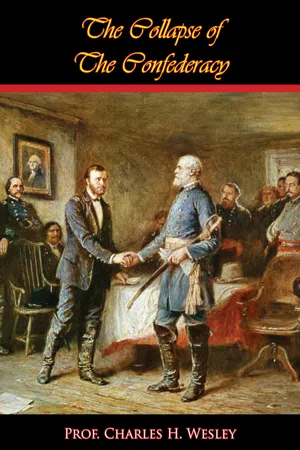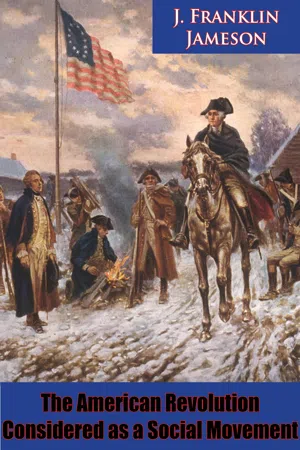Confederate Economy
The Confederate economy refers to the economic system of the Confederate States of America during the American Civil War. It was primarily agrarian, relying heavily on cotton and tobacco production, and lacked the industrial infrastructure of the Union. The Confederate economy faced significant challenges due to blockades, inflation, and resource shortages, contributing to the eventual defeat of the Confederacy.
3 Key excerpts on "Confederate Economy"
- eBook - ePub
- Prof. Charles H. Wesley(Author)
- 2016(Publication Date)
- Golden Springs Publishing(Publisher)
...So general did the circulation become that a law was passed by the Confederate Congress prohibiting trade with the currency of the Northern government. The states also issued notes which were to circulate as money and the people accepted the state notes more willingly than the Confederate currency. Towns, counties, and insurance companies issued promises to pay. The currency was greatly deranged by these issues of paper money. This situation is graphically described by G. C. Eggleston when he quotes a friend as saying, “Before the war I went to market with the money in my pocket and brought back my purchases in a basket; now, I take the money in a basket and bring the things home in my pocket.” {55} War Supplies and Manufactures The South was undergoing an economic renaissance during the decade 1850-1860. It was rapidly turning from an agricultural to an industrial economy. Manufacturing increased rapidly, and if the war had not come, it seems safe to conjecture that the South would have attempted to develop with slaves an industrial life as one of its auxiliaries. {56} In spite of this development, the South was not adequately supplied during the war with materials, and it was seriously handicapped by this scarcity although there was not an absolute dearth of materials at any period of the war. Prior to 1861, manufactured products had come mainly from the North, The beginning of hostilities cut off this supply and forced upon the South the establishment of a variety of industries. The greatest handicaps to the development of manufacturing in the South were the lack of adequate raw materials and the deficiency of trained industrial leaders. There were raw materials, but those which were known were either insufficient or unprocurable. Technicians and skilled artisans had not been welcomed in the Southern states. Plantation life had produced a leadership dependent upon agricultural life and domestic economy...
- eBook - ePub
- David Herbert Donald(Author)
- 2015(Publication Date)
- Golden Springs Publishing(Publisher)
...Rail centers, like Chattanooga and Atlanta, were taken and new gaps thereby made in the already defective railroad system. The capture of New Orleans, only a year after the fighting had begun, meant the loss of the Confederacy’s financial heart. As the Union armies took over more and more Southern territory, there was a continual shrinking of the area within which Confederate notes passed as money. And as this area contracted, the quantity of paper money in it increased even more rapidly than the treasury put forth new issues, for Southerners living in the occupied territory got rid of their Confederate money by sending it to places where it still had at least a little value—to places where the Stars and Bars still waved. The more ground the Confederacy lost in battle, the worse the problem of inflation became. Meanwhile, in filling her armies, the South had to draw off from the economy a much higher proportion of her manpower than the North did of hers. The South’s capacity to produce, already so small by comparison, was made even smaller by a disproportionate reduction of her labor supply. While Union military power was weakening the Southern economy, Union naval power had the same effect in perhaps even greater degree. The blockade, by bringing about serious shortages in strategic items, not only added to the inflationary trends but also frustrated efforts to maintain the transportation network and to increase industrial output. And, toward the end of the war, the Southern loss of faith in victory, as has been seen, contributed to the currency depreciation and to the economic disorganization that ensued. Thus psychological influences, resulting from military events, fatally affected economic conditions. The reverse is equally true. Economic conditions gave rise to psychological influences that seriously affected military events. Strategy itself at times conformed to economic facts...
- J. Franklin Jameson(Author)
- 2017(Publication Date)
- Papamoa Press(Publisher)
...So remarkable a commendation no statesman of our Revolution could have claimed, nor have I any desire to maintain that that war was not, like nearly every other war, accompanied by great losses and injuries to our economic system. What I have tried to show is, that American industry profited by it in the end. The Civil War of sixty years ago, which so desolated and impoverished the South, nevertheless, by sweeping away an obsolete economic and social system, set free the economic life of the South, to enter upon that career of varied and boundless prosperity of which we have seen only the beginnings. The effort of this lecture has been to show in what ways the Revolution brought ultimate benefit to the agriculture, the manufactures, and the commerce of the United States of America....


